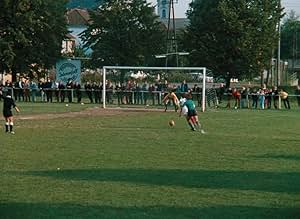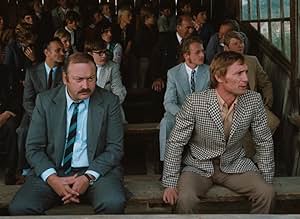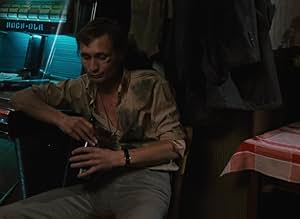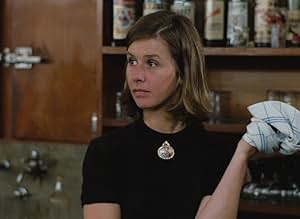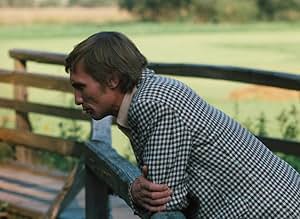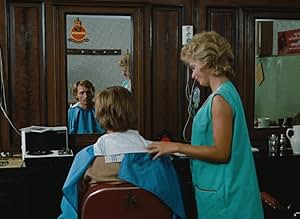Die Angst des Tormanns beim Elfmeter
- 1972
- 1 घं 41 मि
IMDb रेटिंग
6.5/10
2.5 हज़ार
आपकी रेटिंग
अपनी भाषा में प्लॉट जोड़ेंGoalkeeper Josef Bloch is ejected during a game for foul play. He leaves the field and goes to spend the night with a cinema cashier.Goalkeeper Josef Bloch is ejected during a game for foul play. He leaves the field and goes to spend the night with a cinema cashier.Goalkeeper Josef Bloch is ejected during a game for foul play. He leaves the field and goes to spend the night with a cinema cashier.
- पुरस्कार
- कुल 1 जीत
Monika Poeschl
- 1. Frisöse
- (as Monika Pöschl)
फ़ीचर्ड समीक्षाएं
Huh that Wenders guy really knows how to make a good movie. Who would've thought...
It is difficult to comment on such a brilliant movie without having read the book first, or even better, being familiar with Peter Handke's narrative works. While it may seem evident (to us, accustomed to Hollywood's conventional plots) that the main character of The Goalie... is a madman, it is not evident at all. Handke's approach to narrative is to reflect exterior signs, rather than enter the character's inner thoughts. See The Lefthanded Woman for example: while it may seem, on the surface, that the woman does not have a reason for divorce, in fact she might have a lot, only she does not reveal what is on her mind. Same applies to the goalie: he would not speak his mind, therefore we, and even Handke himself (or Wenders) can not enter his own intimate realm. Whatever his reasons are for what he does (and murder is only one of his unexplained acts) we can not know them. The film is about communication between people more than murder. It is funny that most of us would assume he is mad just because we can not find an account of his acts: if you think about it, in the real world outside the movie realm, most people -and even our closest friends- would not tell us why they do what they do. And it does not necessarily mean they are mad.
Based on the novel "Die Angst des Tormannes beim Elfmeter" by Austrian existentialist writer, Peter Handke, The Goalie's Anxiety at the Penalty Kick is a powerful and unnerving film by the great German director Wim Wenders (Wings of Desire, Paris, Texas). As the film opens, the goalie, Joseph Bloch, (Arthur Brauss) is suspended from a soccer game in Vienna for missing a penalty kick. Seemingly not upset, he goes into town, then commits an unplanned and seemingly unmotivated murder of a cinema cashier.
Presenting us with a world that does not fit our picture of what constitutes rational behavior, Wenders refuses to explain the goalie's senseless action. Bloch simply continues his life in a matter-of-fact way, although a great deal of emotion seems to be churning under the surface. He retreats to a country inn to find his old girl friend. Nothing much happens. He goes to the movies, converses with the local residents, drinks a lot, gets into a fight, and ostensibly waits for the police to close in. His expression remains the same no matter what he is doing. As stated by Adam Groves in his review in The Cutting Edge, "He may be a homicidal sociopath, but Joseph seems to fit in quite well with the world around him, which seems to be the whole point"
Bloch talks about his life as a goalie throughout the film. At the end, he wanders into to a local soccer game and explains to a visiting salesman the thoughts that go through a goalie's mind during a penalty kick, for example, how the goalie must outguess the shooter. Perhaps dramatizing the dehumanizing effects of modern society, Goalie's Anxiety at the Penalty Kick is a strange, intriguing, and complex film that definitely deserves repeated viewing to unlock the puzzle. A possible hint involves a repetitive theme of a lost boy who drowned because he couldn't communicate.
Presenting us with a world that does not fit our picture of what constitutes rational behavior, Wenders refuses to explain the goalie's senseless action. Bloch simply continues his life in a matter-of-fact way, although a great deal of emotion seems to be churning under the surface. He retreats to a country inn to find his old girl friend. Nothing much happens. He goes to the movies, converses with the local residents, drinks a lot, gets into a fight, and ostensibly waits for the police to close in. His expression remains the same no matter what he is doing. As stated by Adam Groves in his review in The Cutting Edge, "He may be a homicidal sociopath, but Joseph seems to fit in quite well with the world around him, which seems to be the whole point"
Bloch talks about his life as a goalie throughout the film. At the end, he wanders into to a local soccer game and explains to a visiting salesman the thoughts that go through a goalie's mind during a penalty kick, for example, how the goalie must outguess the shooter. Perhaps dramatizing the dehumanizing effects of modern society, Goalie's Anxiety at the Penalty Kick is a strange, intriguing, and complex film that definitely deserves repeated viewing to unlock the puzzle. A possible hint involves a repetitive theme of a lost boy who drowned because he couldn't communicate.
The Goalkeeper's Fear of the Penalty is a great title but an odd underwhelming film from Wim Wenders, his cinematic debut.
I only wish it was about a goalkeeper who went all wobbly when about to face a spot kick.
The film does display some of Wender's cinematic tastes. A liking of Americana, being on the road, a character being a person of few words maybe alienated and a languid pace. There is an existentialism about this film.
Joseph Bloch (Arthur Brauss) is a goalkeeper who gets angry when a goal is not called offside. It is a strangely shot sequence as Bloch does not concentrate on the play and makes no attempt to even save the shot. In fact we do not even see the build up to the play.
Bloch gets sent off and as his team was playing away, he makes his way to the city centre where he watches a film. Later he spends a night with the cinema cashier and he than strangles her. Bloch then leaves the city and spends times with an ex girlfriend in the countryside. Bloch constantly reads the newspaper to see what is happening about the murder, there is also a mute boy who has disappeared. Bloch spends time with his ex, listening to American rock n roll and getting involved in bar fights.
If Bloch is upset about the murder we do not get to know about it. The movie is bookended by a football match, at one point Bloch tells a spectator about the various thoughts that go through in a goalkeeper's mind when a penalty is about to be taken.
The lead character is an enigma, he goes about his normal life but he is a killer, maybe he has killed before, maybe he is a fantasist with his interest in American music and carrying US currency. It could just be that Bloch is contemplative about his existence.
In terms of tension, there is not much at all. Bloch gets on with his life, he is never in danger, no one is closing in on him. Critically lauded, age has not been kind to this film. Slow moving and boring.
I only wish it was about a goalkeeper who went all wobbly when about to face a spot kick.
The film does display some of Wender's cinematic tastes. A liking of Americana, being on the road, a character being a person of few words maybe alienated and a languid pace. There is an existentialism about this film.
Joseph Bloch (Arthur Brauss) is a goalkeeper who gets angry when a goal is not called offside. It is a strangely shot sequence as Bloch does not concentrate on the play and makes no attempt to even save the shot. In fact we do not even see the build up to the play.
Bloch gets sent off and as his team was playing away, he makes his way to the city centre where he watches a film. Later he spends a night with the cinema cashier and he than strangles her. Bloch then leaves the city and spends times with an ex girlfriend in the countryside. Bloch constantly reads the newspaper to see what is happening about the murder, there is also a mute boy who has disappeared. Bloch spends time with his ex, listening to American rock n roll and getting involved in bar fights.
If Bloch is upset about the murder we do not get to know about it. The movie is bookended by a football match, at one point Bloch tells a spectator about the various thoughts that go through in a goalkeeper's mind when a penalty is about to be taken.
The lead character is an enigma, he goes about his normal life but he is a killer, maybe he has killed before, maybe he is a fantasist with his interest in American music and carrying US currency. It could just be that Bloch is contemplative about his existence.
In terms of tension, there is not much at all. Bloch gets on with his life, he is never in danger, no one is closing in on him. Critically lauded, age has not been kind to this film. Slow moving and boring.
Spoiler alert, this is not a film about soccer at all, and there is no drama surrounding a penalty kick. Wim Wender's first film is a rather ponderous foray into the randomness of violence and suffering in the world. The anxiety here, the terror, is in just how senseless it is, as senseless as that goal scored while the goalie is barely paying attention in the opening scene. The anxiety is also in knowing that ordinary people wandering around have that in them, or could have committed such an act in the spur of the moment, and then gone on with their lives.
In addition to a critical point of violence that the film rests upon, we see smaller references, such as the goalie getting beaten up in the street a couple times, a reference to the murder of Sharon Tate, and a story in the papers is that a young boy has gone missing, presumably harmed. We see it in the goalie's case as being completely unplanned, which is shocking in itself, but it's also disconcerting when what follows is not a traditional crime drama, with a detective then trying to track him down. Life simply goes on.
In a minor key, I felt the usual kinds of questions, e.g. Will he do it again, and will he be caught, but those were not the main things causing tension. It was more like, why did he end up doing that to the young woman and not one of the other women he meets while traveling around? Does the world even care, listening to the buoyant music from the 50's and 60's? Is the veneer of civilization so thin that there are other sociopaths we see (in the film or in real life), who have done such things? These are haunting, existential questions. We wish for life to make sense and be fair, but oftentimes it is neither. Those big moments in soccer, or our favorite sports, as much as we get wrapped up in them - they seem trivial by comparison - but even there, we see randomness, the goalie guessing to dive left or right at the penalty kick.
I liked the concept for the film and how it managed such brutal statements about the world in such a low-key way, but I have to say, watching it was not terribly interesting. The dispassionate feeling of the killer and the disconnected events which follow don't make for a compelling story, and the film moves along very slowly. It doesn't escalate and there is little to no transformation, so what we're left with is this dark commentary, which felt as flat as it was depressing. It's worth seeing if you're a Wenders fan, but it's tough to recommend without reservations.
In addition to a critical point of violence that the film rests upon, we see smaller references, such as the goalie getting beaten up in the street a couple times, a reference to the murder of Sharon Tate, and a story in the papers is that a young boy has gone missing, presumably harmed. We see it in the goalie's case as being completely unplanned, which is shocking in itself, but it's also disconcerting when what follows is not a traditional crime drama, with a detective then trying to track him down. Life simply goes on.
In a minor key, I felt the usual kinds of questions, e.g. Will he do it again, and will he be caught, but those were not the main things causing tension. It was more like, why did he end up doing that to the young woman and not one of the other women he meets while traveling around? Does the world even care, listening to the buoyant music from the 50's and 60's? Is the veneer of civilization so thin that there are other sociopaths we see (in the film or in real life), who have done such things? These are haunting, existential questions. We wish for life to make sense and be fair, but oftentimes it is neither. Those big moments in soccer, or our favorite sports, as much as we get wrapped up in them - they seem trivial by comparison - but even there, we see randomness, the goalie guessing to dive left or right at the penalty kick.
I liked the concept for the film and how it managed such brutal statements about the world in such a low-key way, but I have to say, watching it was not terribly interesting. The dispassionate feeling of the killer and the disconnected events which follow don't make for a compelling story, and the film moves along very slowly. It doesn't escalate and there is little to no transformation, so what we're left with is this dark commentary, which felt as flat as it was depressing. It's worth seeing if you're a Wenders fan, but it's tough to recommend without reservations.
क्या आपको पता है
- ट्रिवियाThe film remained unavailable for three decades for reasons of music rights. (The original soundtrack includes works of Elvis Presley and the Rolling Stones, which is more expensive than the production of the film itself. ) To make the film possible to view again, the director Wim Wenders obtains the right of several songs and replaces other pieces with new songs of lyrics. Those were produced using period instruments and analog techniques from the 1950s to imitate the sound of that time as faithful as possible.
- गूफ़The newspaper article "Heiße Spur im Mordfall Gloria T." (Firm lead in Gloria T. murder case) is actually a newspaper article about a car crash and has nothing whatsoever to do with the movie's plot. It seems that only the headline was changed for the purpose of filming.
- कनेक्शनFeatured in Motion and Emotion: The Films of Wim Wenders (1990)
टॉप पसंद
रेटिंग देने के लिए साइन-इन करें और वैयक्तिकृत सुझावों के लिए वॉचलिस्ट करें
- How long is The Goalie's Anxiety at the Penalty Kick?Alexa द्वारा संचालित
विवरण
- रिलीज़ की तारीख़
- कंट्री ऑफ़ ओरिजिन
- भाषाएं
- इस रूप में भी जाना जाता है
- The Goalie's Anxiety at the Penalty Kick
- फ़िल्माने की जगहें
- उत्पादन कंपनियां
- IMDbPro पर और कंपनी क्रेडिट देखें
बॉक्स ऑफ़िस
- बजट
- DEM 6,20,000(अनुमानित)
इस पेज में योगदान दें
किसी बदलाव का सुझाव दें या अनुपलब्ध कॉन्टेंट जोड़ें

टॉप गैप
By what name was Die Angst des Tormanns beim Elfmeter (1972) officially released in India in English?
जवाब
